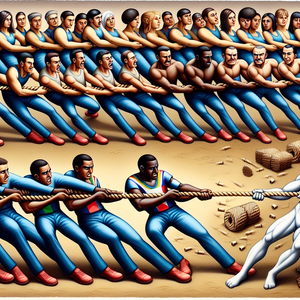From MIT to Market: How Boston's Research Translates to Hardware Innovation

The foundation of Boston's hardware innovation lies in its unique ecosystem. The collaboration between universities, entrepreneurs, and investors creates a fertile ground for translating research into viable products. MIT's emphasis on entrepreneurship, coupled with its robust network of alumni and industry connections, fosters an environment ripe for innovation. The university encourages students and researchers to think beyond the lab, often leading to the creation of startups that commercialize their research findings. For instance, the MIT Media Lab is renowned for its interdisciplinary approach, bringing together experts from computer science, design, and social sciences. This collaborative environment has led to numerous innovations that have found their way into the market, such as the development of smart textiles and augmented reality devices. These innovations reflect the lab's mission to merge technology with human experience, pushing the boundaries of what hardware can achieve.
Successful Transitions from Academia to Industry
Several notable companies have emerged from Boston’s academic institutions, showcasing the successful transition of research into commercial products. One such example is Formlabs, a 3D printing company co-founded by MIT graduates. Formlabs revolutionized the 3D printing industry with its affordable and accessible SLA (stereolithography) technology, which was initially developed as a research project at MIT. By leveraging their academic research, Formlabs has grown into a major player in the global hardware market, illustrating how academic innovation can create real-world products. Another example is Kiva Systems, founded by an MIT graduate, which developed robotic systems for warehouse automation. Kiva's technology optimized logistics operations for companies like Amazon, leading to significant efficiency improvements. The success of Kiva Systems demonstrates how academic research can lead to impactful solutions that address real-world challenges in the business sector. Eventually acquired by Amazon, Kiva's journey from a research initiative to a cornerstone of e-commerce logistics underscores the potential of Boston's hardware innovations.
The Role of Incubators and Accelerators
In addition to direct university spin-offs, Boston’s hardware innovation ecosystem is supported by a range of incubators and accelerators. Programs like MassChallenge and Techstars provide mentorship, funding, and resources to startups emerging from academic research. These programs help bridge the gap between research and commercialization, allowing entrepreneurs to refine their ideas, develop prototypes, and connect with investors. For example, Hatch, an incubator focused on hardware startups, has been instrumental in supporting companies that stem from local research initiatives. By offering workspace, funding opportunities, and networking events, Hatch has fostered a community where innovative ideas can flourish and be transformed into market-ready products. Companies like Nimble Robotics and Tive, both of which focus on logistics and supply chain optimization, have benefited from such support.
Challenges and Opportunities
While the transition from research to market is promising, it is not without its challenges. Startups often face hurdles such as securing funding, navigating regulatory landscapes, and competing against established players in the industry. However, Boston’s vibrant investment community is increasingly recognizing the value of hardware innovation, leading to a growing number of venture capital firms willing to support early-stage hardware startups. The COVID-19 pandemic also highlighted the need for innovative hardware solutions, particularly in healthcare. Many Boston-based startups pivoted to address the urgent demands of the pandemic, developing products such as portable ventilators and remote health monitoring devices. For example, Vaxess Technologies, which utilizes MIT research in sustainable healthcare delivery, adapted its technology to create products that facilitate vaccine distribution. This adaptability underscores the potential for research-driven innovation to respond to the evolving needs of society.
Boston's unique ecosystem of research, entrepreneurship, and investment serves as a powerful catalyst for hardware innovation. The successful transitions of projects from prestigious institutions like MIT and Harvard into viable commercial products demonstrate the impactful synergy between academia and industry. As Boston continues to nurture its hardware startup scene, the city will likely remain a pivotal player in the global technology landscape, driving advancements that not only reshape industries but also improve lives. The journey from MIT to market is a testament to the power of innovation, collaboration, and the relentless pursuit of progress. From 3D printing to robotics, the hardware innovations emerging from Boston are not just shaping the local economy; they are setting trends that resonate worldwide.
Hardware Product Manager
Formlabs, Kiva Systems, various Boston-based hardware startups
Core Responsibilities
Oversee the product development lifecycle from conception to launch, ensuring alignment with market needs and company strategy.
Collaborate with engineering and design teams to define product specifications and features based on user feedback and market research.
Conduct competitive analysis and market assessments to identify opportunities for product differentiation.
Required Skills
Strong understanding of hardware development processes and technologies, with experience in the electronics or consumer tech sector.
Excellent project management skills, including the ability to prioritize tasks and manage timelines effectively.
Exceptional communication skills to liaise with technical teams as well as non-technical stakeholders.
Robotics Software Engineer
Kiva Systems, Boston Dynamics, various robotics startups
Core Responsibilities
Design and implement software systems for robotic applications, focusing on navigation, perception, and control algorithms.
Collaborate with hardware engineers to integrate software with physical systems, ensuring optimal performance and reliability.
Test and debug robotic systems in real-world environments to refine algorithms and enhance functionality.
Required Skills
Proficiency in programming languages such as C++, Python, or ROS (Robot Operating System).
Strong background in algorithms, machine learning, and computer vision as they pertain to robotics.
Experience with simulation tools and hardware-in-the-loop testing.
Embedded Systems Engineer
Formlabs, Analog Devices, various tech startups focusing on IoT and smart devices
Core Responsibilities
Develop and optimize embedded software for hardware devices, ensuring efficiency and performance in resource-constrained environments.
Work closely with hardware engineers to design custom circuits and interfaces for new products.
Conduct unit testing and debugging of embedded systems to guarantee reliability and compliance with specifications.
Required Skills
Expertise in C/C++ programming and familiarity with real-time operating systems (RTOS).
Hands-on experience with microcontrollers and hardware debugging tools.
Strong analytical skills to troubleshoot and resolve complex hardware/software integration issues.
UX/UI Designer for Hardware Products
Bose, Fitbit, emerging hardware startups in Boston
Core Responsibilities
Create intuitive user interfaces and experiences for hardware products, focusing on usability and aesthetic appeal.
Conduct user research and testing to gather feedback, iterating on designs based on real-world usage.
Collaborate with product managers and engineers to ensure design feasibility and alignment with technical constraints.
Required Skills
Proficiency in design tools such as Sketch, Adobe XD, or Figma, along with a solid understanding of design principles.
Strong portfolio showcasing experience in designing for hardware or consumer electronics.
Excellent communication skills to present design concepts and rationale to stakeholders.
Supply Chain Analyst in Hardware Manufacturing
Amazon (particularly Kiva Systems), Dell, various hardware manufacturing firms in Boston
Core Responsibilities
Analyze supply chain data to optimize sourcing, inventory management, and logistics processes for hardware production.
Collaborate with suppliers and manufacturers to ensure timely delivery of components and materials.
Identify areas for cost reduction and process improvement within the supply chain.
Required Skills
Proficiency in data analysis tools (e.g., Excel, SQL) and familiarity with ERP systems.
Strong problem-solving skills with a focus on efficiency and scalability in manufacturing processes.
Understanding of hardware production cycles and supply chain logistics specific to the tech industry.


